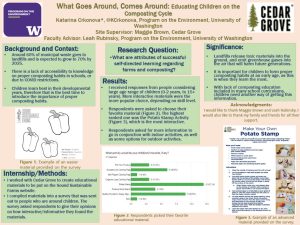What Goes Around, Comes Around: Educating Children on the Composting Cycle
Composting is the most basic form of recycling. As humans produce more and more waste, it is important to create proper composting habits, especially at an earlier age. The purpose of this study is to discover what the successful attributes of at-home educational materials relating to farms and composting are. Considering the lack of access to on-site learning at times, particularly during times of COVID, it is important to provide the means for learning at home. I worked with Cedar Grove, a regional PNW composting company, to create various types of educational materials, which were then compiled and shared via survey. The survey was shared with people who are around children and can give their opinions on which materials seemed most interactive and informative to them. Despite respondents considering a wide age range of children, general consensus shows that higher levels of interaction are desirable for most ages. With the lack of composting education incorporated in many school curriculums, having an interactive and informative way to learn from home allows the future generations to form proper composting habits early on. With these habits, we will see organic waste being diverted from overflowing landfills and being used in a more efficient way that is beneficial for the health of the environment and the people it is home to.
